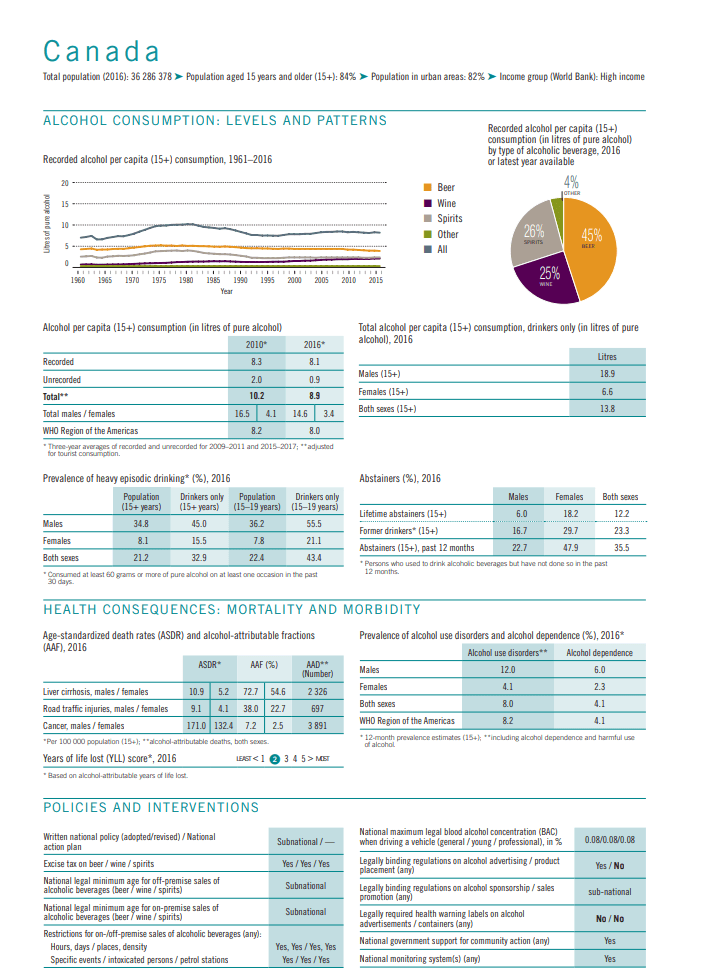In Canada alcohol policy is mainly in the purview of the provinces and territories and not the central government. This causes numerous problems. For example, the country does not have a comprehensive national alcohol act or a national strategy. Overall, the alcohol industry is not effectively regulated in Canada causing a host of severe alcohol problems in the country.

The province of Ontario is a sad example of the problems linked to the lack of national alcohol policy approaches. It has long favored the interest of alcohol industry over the people’s wellbeing in their provincial alcohol policy making.
As Movendi International reported previously, a change to alcohol control policy in 2015, allowed alcohol to be sold in grocery stores. This led to youth in Ontario consuming alcohol at more high-risk patterns.
The Ontario government has been changing its alcohol policy in favor of the industry even as the coronavirus pandemic was spreading across Canada. Reportedly, alcohol use and related problems are rising in Canada as people attempt to self-medicate with alcohol to cope with stress, anxiety and uncertainty or to deal with boredom during the ongoing public health crisis. This is a troubling trend that could lead to rising numbers of mental health problems, including alcohol use disorder.
The weakening of alcohol policy measures in Ontario has further increased alcohol harm. For instance, Thunder Bay Area police in Ontario reported there were 299 DUI charges in 2020 compared to 204 in 2019.
Tim Stockwell, a scientist with the University of Victoria’s Canadian Institute for Substance Use Research, says the easy availability of alcohol, coupled with people staying more at home and consuming more alcohol are reasons for the higher DUI charges in Ontario.
Due to the Ontario government’s weakening of alcohol policy rules, alcohol became even more easily available and accessible – such as through home delivery and extrem price promotions.
Stockwell suggests a minimum unit price (MUP) to target the problem of heavy alcohol use that is further growing during the pandemic. MUP is highly effective in eliminating the cheapest, often high-strength, alcohol products that Big Alcohol uses to promote heavy alcohol use. This in turn would then reduce road safety issues and other public health problems caused by alcohol. Scotland has experienced positive effects after the introduction of MUP.
Other measures suggested by Stockwell include not privatizing the liquor industry, limiting hours of sale, limiting the places of alcohol retail, esnuring alcoohol is not sold in grocery stores, and banning the advertising of alcohol. These suggestions align with the World Health Organization’s recommended Best Buy policies to prevent and reduce alcohol harm effectively..
Lethal interaction between alcohol and COVID-19
A brand new and ground-breaking report “Alcohol and the coronavirus pandemic: individual, societal and policy perspectives” written by a group of international experts including Tim Stockwell, outlines alcohol’s health, social and economic burden during COVID-19. The report was supported by civil society organizations including Movendi International.
Key findings in the report:
- Alcohol amplifies the effects of the pandemic in many ways.
- Physiological impacts of alcohol weaken the immune system and functioning of many organs, thereby increasing the risk of viral infection, severity, recovery and long-term consequences.
- Alcohol-centric social contexts have played a crucial role in the transmission and propagation of the coronavirus pandemic.
- Alcohol harm impedes effective responses to the pandemic by healthcare systems pushed to the brink. For example, on average, alcohol contributes to 20% of injuries and 11.5% of all non-injury emergency department presentations.
- Declaring alcohol ‘essential’ – as some jurisdictions have done – has fueled greater numbers of other alcohol-related illnesses and injuries.
- Countries that implemented evidence-based alcohol policy measures saw specific reductions in emergency room and hospital admissions over and above the effects of lockdowns.
- Case studies from around the world show, that the alcohol industry lobbying efforts have sought to undo every element of effective alcohol policy known to reduce alcohol’s health and social burden. For example, by seeking to reduce taxes, make alcohol widely available and remove restrictions on marketing.
The authors suggest the following key recommendations to address alcohol harm during the pandemic:
- Maintain and improve alcohol policy measures;
- Limit alcohol availability and affordability and make use of evidence-based alcohol pricing policies;
- Ensure effective public health messaging on alcohol and COVID-19 from health authorities;
- Make clinical and treatment provisions for people experiencing all types of alcohol-related problems; and
- Increase access to mental health services, including online services.
